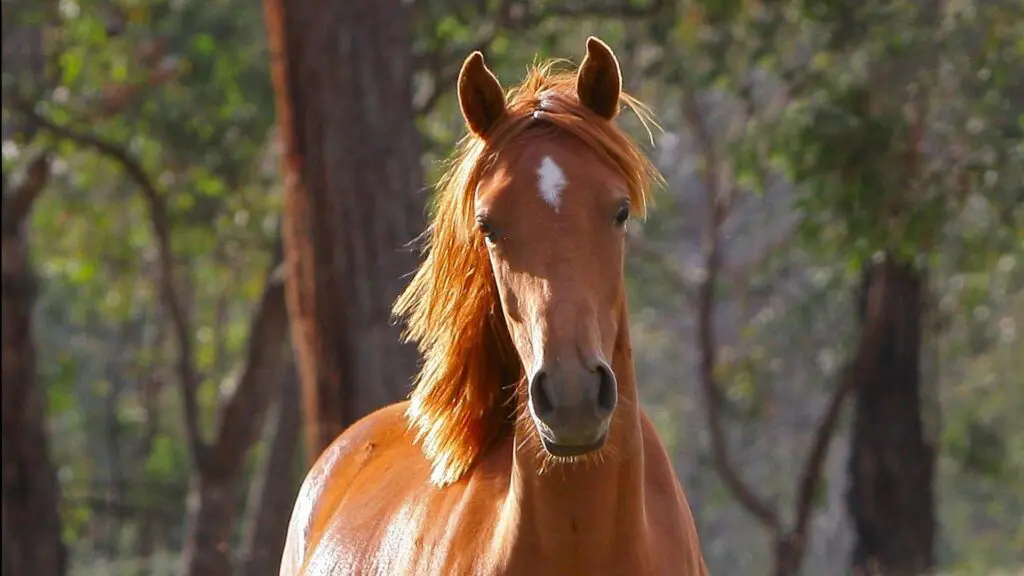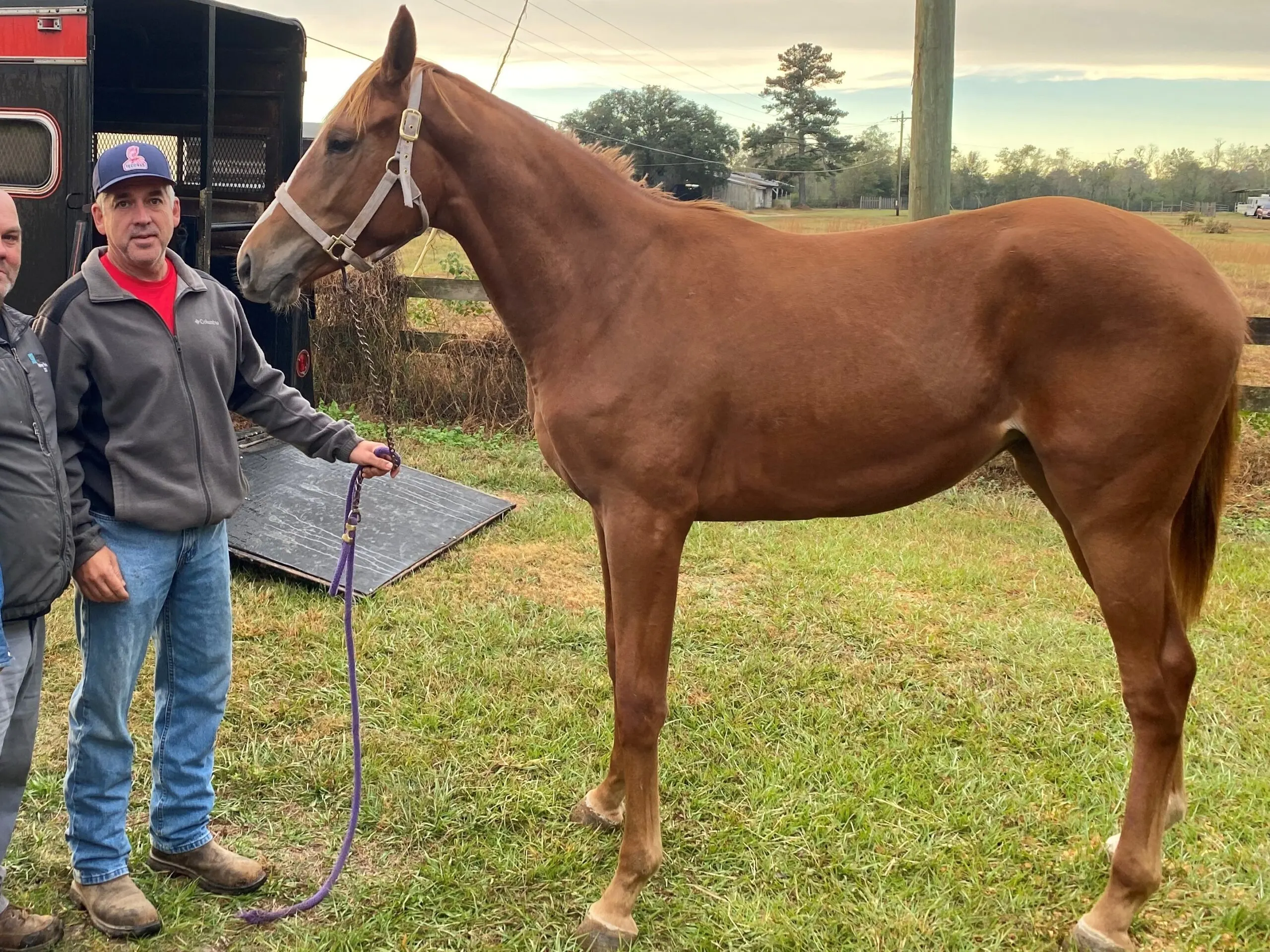Last updated: January 16, 2023
Those of us who’ve been around horses a great deal know that horses are sensitive animals. They have to be; for all of their size, they are prey animals rather than predators. Does that mean they can sense fear in humans?
Horses can sense fear in any animal. Some call it an instinct, but science has other ideas. Some emotions, particularly strong ones, give off a scent. They are called pheromones, and they can be smelled by any animal and by some humans.
There is, as always, more to their acute perception than just the smell of pheromones. Horses have a unique ability to sense danger in their environment.

Horses can sense fear in a rider.
Now let’s look at riders. There are issues with the experienced rider and the inexperienced rider. Horses, as previously mentioned, are large animals. Our horse was six feet at the withers.
Her head, when she held it up, was well over mine… and I’m tall. Having an animal tower over you can and does scare many new riders half to death. The problem is, the horse knows it, and this causes the horse to have anxiety issues.
They are alert; what is the danger? The horse doesn’t see itself as a danger. Therefore, to the horse, something is very wrong with the picture. Unless they’ve been trained to ignore this instinct, it could go badly for both horse and rider.
The problem that can crop up for any rider, new or experienced, is the spook factor. Horses have spooked for the strangest reasons, and sometimes it seems that they do it for no reason.
On one ride, the horse spooked at a sheet of paper someone carelessly left on the trail. Another time, it was the tarp… the same tarp that had been in the same place for months.
Spooking is, in part, due to a horse’s unique vision. However, the spooks with no explanation are probably caused by anxiety in another animal, fearing something we aren’t aware of.
If it’s a rabbit or squirrel that almost got stepped on, the horse won’t see it, and the rider may not notice it. It can make the horse take off, crow hop, or use other evasive tactics.

Horses can sense other emotions besides fear.
There are several blends, and they are readily available online. Amazon sells a behavior support supplement called Vetoquinol Zylkene, and it has some good reviews.
However, I haven’t tried it or know anyone who has used it. I recommend you consult a veterinarian before starting a horse on this product.
You may have seen someone that can walk up to any animal and have the animal accept them. Hopefully, they exercise caution around those that could do them harm, but there is a reason they can do that.
It is the pheromones they exude; love, joy, and happiness. Horses can smell that, and they can also sense disgust. Horses can sense and perhaps smell confidence.
A certain amount of confidence is needed when handling such a large animal. It helps establish to the horse who is alpha, something the horse craves to know.
However, it doesn’t do to be overconfident around horses. That is for your protection as well as its. Overconfidence leads people to think they can do more than they are as yet able to do.
It can also lead them to make mistakes when approaching the horse. Those mistakes, at best, will make caring for the horse difficult. A few stalls down from our horse was an Arabian.
Its owner was the super confident kind. It turned out to be a radical mistake… requiring facial reconstruction for her. This is a true story, and I don’t know the end of it; she was gone for months, and by then, we’d moved our horse.
Yes, horses can sense fear and many other emotions. It is a survival thing for them. If they couldn’t, they’d be in a lot of trouble in the wild.
Since it is clear that horses can sense fear, you may wonder if they can sense other emotions. The answer to that is a qualified yes. For example, you can buy pheromones to help anxious horses and/or young horses that have been separated from their dams.
Horses have keen senses.
Let’s consider a horse’s vision. Most people assume that animals see the same things we do and in the same way. If you look at a horse’s face, you’ll see that this is unlikely. It is tough for them to look down in front of them, just by how the head is made.
The eyes of a horse are on the side of their heads rather than in front. While this gives them better peripheral vision, it often means that the eyes don’t work together.
When a horse sees something from what’s called monocular vision, it will turn its head and focus both eyes; binocular vision, on it. It will also perk up its ears to hear better.
If you’ve looked in a mirror, you may have noticed that the pupils of your eyes are not usually huge. A horse’s pupils are naturally very large. The large size of their pupils gives them a nearly full view all around their bodies due to the enhancement of peripheral vision.
That doesn’t mean they see what we see. It’s within four feet of them, and it is difficult for them to focus on it. It’s also why those who care for them make sure not to come up behind them suddenly.
Care is taken to approach from the left side, and the caretaker talks to the horse as they come up to it.
Horses are herd animals.
There are other reasons horses need to be able to sense fear. Horses are herd animals, and there is a herd hierarchy, which establishes where each horse has a place.
If a horse is alone, that protection isn’t there. It makes the caretaker’s job even harder because either the caretaker is the alpha or the horse is. You don’t want to go with the latter.
If you’ve seen videos of horses running from the Bureau of Land Management roundups, you can see that one horse starts and they all take off. One horse became afraid, and that fear communicated to the others with a flee response. The sense of fear has been an effective survival tool for horses.

Approach a horse with confidence
When you approach a horse, walk with confidence and don’t make sudden movements. Speak to your horse as you walk towards it calmly and soothingly. Remember, a horse will sense fear, so remain confident.
Get in the habit of approaching your horse in the same manner, each time. We walk to our horses from the left front, never from its rear. You want to avoid being in the animal’s blind spot.
Once you are close enough, give your horse a rub on its shoulder and continue to talk softly. If you intend to halter the horse, now is the time to lay the lead rope over its neck and loop it around.
Now slide the halter over its nose, put the crownpiece over the horse’s ears, and make sure it fits correctly. We always remove halters before turning horses out in the pastures. However, I know plenty of people who keep their horses in halters.
I’ve seen a lot of animals hurt by getting hung up when wearing halters in pastures, so I decided not to risk injury and always turn our horses out without halters.

FAQ
Can horses sense danger?
Horses can sense danger, and it’s through keen senses they survived for thousands of years. Horses are large prey animals without weapons such as claws, horns, are sharp fangs to defend themselves. So when they sense danger, they use their speed and quickness to escape danger.
Can a horse remember you?
Horses have excellent memories and can remember you even after a long separation. They use all their sense to form a memory, such as smell, color, body type, and even how you walk.
Related articles:
- Horses Can’t Vomit! Have You Ever Wondered Why?
- What a Horse Eats: An Essential Guide
- Why Does My Horse Eat Dirt?
- What Does it Mean When a Horse Pins its Ears Back?
- What Can We Learn from a Horses’ Teeth?
- Are Horses Smart? Equine Intelligence Facts and Testing Info
- To learn why some racehorses bleed from their nose, click here.
- To read about what we can learn from a horse’s teeth click here.
- To read about the sounds horses make click this link.
Resources
Meet Miles Henry
An avid equestrian and seasoned racehorse owner, Miles Henry brings his extensive experience to the equine world, proudly associating with the AQHA, The Jockey Club, and various other equine organizations. Beyond the racetrack, Miles is an accomplished author, having published various books about horses, and is a recognized authority in the field, with his work cited in multiple publications.
🔗 Connect with Miles:
Twitter
Facebook
YouTube: Check out race highlights, horse care tips, and more!

